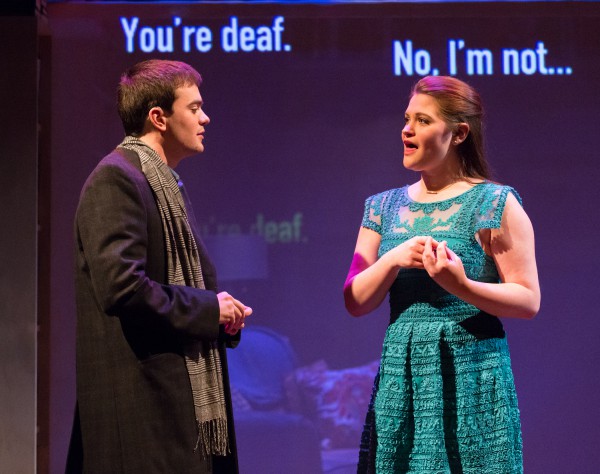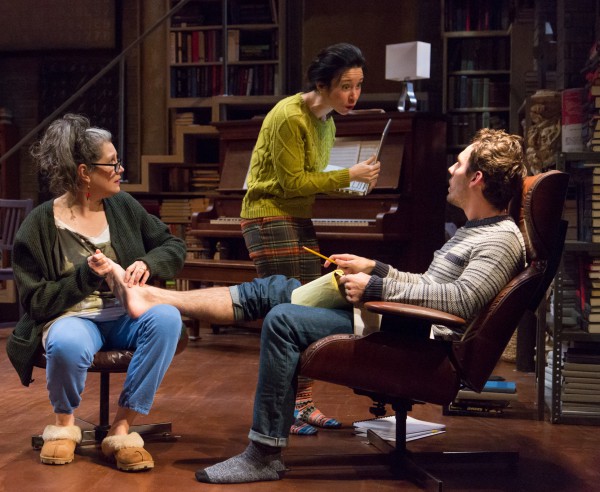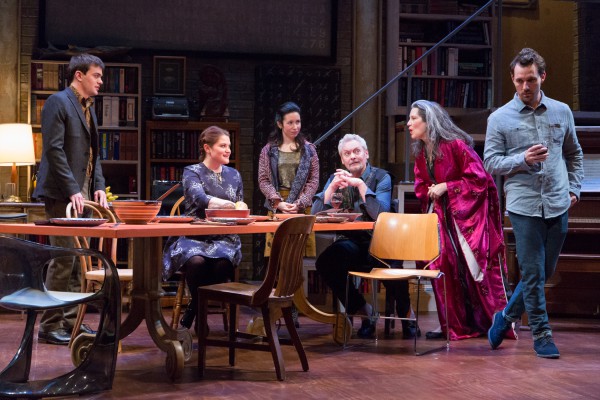Why ‘Tribes’ Might Be the Play of the Year
- Like
- Digg
- Del
- Tumblr
- VKontakte
- Buffer
- Love This
- Odnoklassniki
- Meneame
- Blogger
- Amazon
- Yahoo Mail
- Gmail
- AOL
- Newsvine
- HackerNews
- Evernote
- MySpace
- Mail.ru
- Viadeo
- Line
- Comments
- Yummly
- SMS
- Viber
- Telegram
- Subscribe
- Skype
- Facebook Messenger
- Kakao
- LiveJournal
- Yammer
- Edgar
- Fintel
- Mix
- Instapaper
- Copy Link
How good a play is Tribes? To answer properly, I’d have to be all thumbs. Then I could give it ten thumbs up.
Or nine, anyway. Maybe it falls a bit short of perfection. The point is that multiples and superlatives are needed to describe this play by Nina Raine, currently at City Theatre, because it is such an abundant play.

When Billy (Tad Cooley) meets Sylvia (Amanda Kearns), the wheels of love begin to spin—along with the pinwheels of crazy ambiguity that make “Tribes” a true-to-life trip.
There is so much happening in Tribes, on so many levels, that it can feel as if you’re watching several good plays wrapped into one. And with a crackling script that propels a cast of loose-cannon characters in sundry directions, you never know what’s coming next. It’s remarkable how the action keeps shifting seamlessly through such a wide range of dramatic gears—from sheer silliness to wicked sarcasm, from philosophical perplexity to naked emotion.
Am I making it clear that Tribes is thematically rich? That it’s a three-ring psycho-circus brimming with attractions for one and all? You may choose to see it or not, but please don’t skip it because you have pigeonholed it, mistakenly, as a special-interest niche play.
As many of us have heard by now, the main story line in Tribes has to do with deaf people seeking an identity in our society. While this is a worthy subject, and one seldom treated on stage, the risk is that some theater fans may put the play low on their priority list. They may feel—pun intended—that it just won’t speak to their own interests very strongly.
In fact the play speaks volumes. More broadly, one could say it’s about borders and boundaries and what might lie beyond. It’s about the cage-match clashes that ensue when people who live in cages (as we all do, in one form or another) try to break out. And whereas lesser talents might turn such material into something heavy-handed and moralistic, here we have a playwright and cast who make it boom high and wide like skyrockets.
The Characters and their Tribal Attributes
As Tribes begins we meet Billy (Tad Cooley), a young deaf man with hearing parents. Billy has been raised to lead a mainstream life: for instance he can lip-read and he can talk, clearly if haltingly, but was never taught sign language. Then he meets a young woman, Sylvia (Amanda Kearns), who is part of the local deaf community. Not only does this lead to romance, it triggers Billy’s desire to forge a place for himself in the deaf culture—a place where he’ll speak the sign language of the realm and consort with a princess thereof.
Hence the title of the play. Our hero wants to leave the family “tribe” and join a new tribe, creating a source of conflict. Billy’s folks dread the notion of his being defined and—in their view—confined within the bounds of an insular minority. Won’t he miss the larger vistas of the so-called normal world?
But there’s irony in this, for the members of Billy’s family are not exactly normal citizens either. Indeed they shun the label. They live in the kind of bubble that certain intellectuals like to inhabit, floating (or at least aspiring to float) in a sphere of rarefied ideas and aesthetics, far above the commoners on Main Street.
The father, Christopher (John Judd), is an academic critic of some renown. He’s also what some Pittsburghers call a supermarket dad: the Giant Ego of the family, out to dictate everything from what people wear—it has to be “conventionally unconventional,” as Billy sneers—to how they think. Meanwhile his wife Beth (Laurie Klatscher) has her hands full trying to play mom-as-mediator. She must put up with dad while tending her brood of gilded chicks, who remain bound to the nest.

Who’s in charge here? Is it Mom (Laurie Klatscher) with her foothold, Ruth (Robin Abramson) with her Wifi access, or Daniel (Alex Hoeffler) with his thesis claiming that “language is useless”?
Billy’s siblings are not deaf but they grapple with their own constraints. Sister Ruth (Robin Abramson), a would-be opera singer, can’t seem to land the big role or snare an acceptable man. Exquisitely cultured yet unfulfilled, Ruth sums up her situation concisely: “I feel like a fucking bonsai tree,” she says.
And brother Dan (Alex Hoeffler) may well be the most interesting character in Tribes. A jittery, wisecracking dynamo, Dan has oodles of energy and intellect but no center. So he fills the void by channeling all the tensions that surround him…and by lashing out in contradiction.
The Language Riddle
Early in the play, Dan‘s father asserts loftily that “We don’t know what our feelings are until we put them into words.” Then we learn that Dan is trying to make his mark in academe by writing a thesis which argues the opposite. “Language is radically indeterminate,” says the un-favorite son, and “ultimately, language is useless.”
Which raises another theme permeating Tribes: the riddle of language. Years ago, the philosopher Martin Heidegger famously wrote that “Language is the house of being”—implying that our experience is shaped and determined by the words we use to frame it. But to what extent is this true? And to what extent does “real” life exist on some other plane, fantastically more intricate, at which words can only hint?
These are not merely academic questions. When you live in a sea of words, as we all do—as even deaf people do, whenever they sign or lip-read, or read written words or write them—it may help to know what’s up with that. Are we communicating off the wrong foot? Like the man in the joke who looks for his keys under the street light, do we limit ourselves to thinking where the words are? Can we find something better?
When Billy brings home his girlfriend Sylvia to meet the family, the scene is electric, with feathers ready to fly. Sylvia is asked how to say “love” in sign language. Her answer (she too can speak) is, like so much of the play, wonderfully ambiguous: “You don’t have to pin the emotion down to just one word.”
… Must You, Really?
Further themes and subplots abound in Tribes. They intersect to set off fireworks across the spectrum. During one stretch I found myself giggling uncontrollably, then plunged deep in thought, then close to tears—all in the span of about three minutes.
Every actor delivers. Amanda Kearns’s Sylvia is a rock; John Judd’s papa Christopher is a spectacularly crumbling rock. Tad Cooley and Alex Hoeffler, as Billy and Dan, put on a brother act full of incredible twists and turns.
I dislike the term “must-see.” It isn’t my place to tell you what you must.
But maybe you don’t want to miss this play.

It’s showdown time, as Sylvia meets the clan. The women are connecting, although patriarch Christopher (John Judd, seated at center) has yet to put his foot in.
Closing Credits + Ticket Info
Tribes, by the English playwright Nina Raine, has won awards in London and New York. The production you’ll see here is directed by Stuart Carden. It has been co-produced by City Theatre and Philadelphia Theatre Company, which presented Tribes with the same cast in Philadelphia earlier this year.
The play runs through March 30 at 1300 Bingham St., South Side. For dates, times, and tickets visit City Theatre or call 412-431-CITY.
Photos by Mark Garvin.
Mike Vargo, a Pittsburgh-based writer and editor, covers theater and other arts for Entertainment Central.
Share on Social Media
- Like
- Digg
- Del
- Tumblr
- VKontakte
- Buffer
- Love This
- Odnoklassniki
- Meneame
- Blogger
- Amazon
- Yahoo Mail
- Gmail
- AOL
- Newsvine
- HackerNews
- Evernote
- MySpace
- Mail.ru
- Viadeo
- Line
- Comments
- Yummly
- SMS
- Viber
- Telegram
- Subscribe
- Skype
- Facebook Messenger
- Kakao
- LiveJournal
- Yammer
- Edgar
- Fintel
- Mix
- Instapaper
- Copy Link
Follow Entertainment Central
Sign up for the EC Newsletter
Latest Stories







